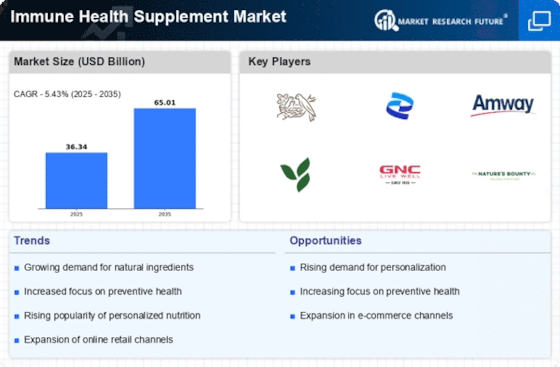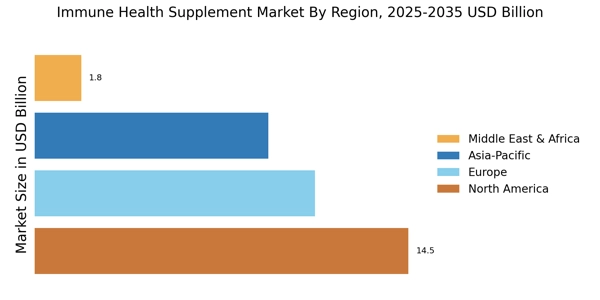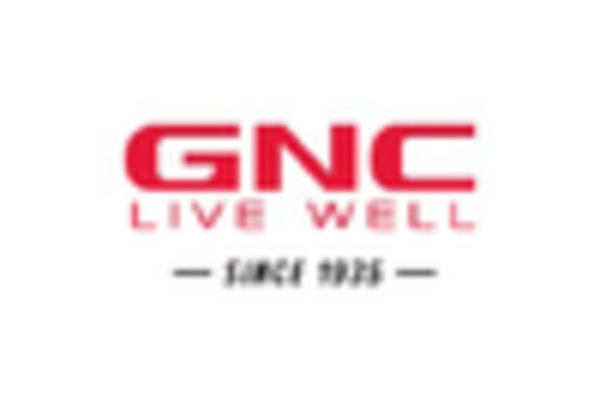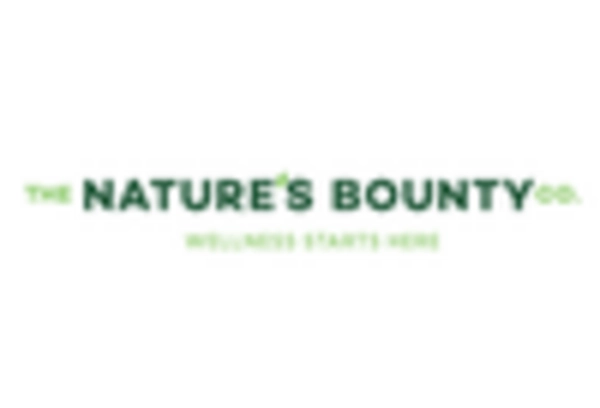Aging Population
The demographic shift towards an aging population is significantly influencing the Immune Health Supplement Market. As individuals age, their immune systems naturally weaken, leading to an increased susceptibility to infections and diseases. Consequently, there is a growing demand for supplements that can bolster immune function among older adults. Market analysis reveals that the segment targeting seniors is expected to witness substantial growth, with projections indicating a rise in sales by over 10% annually. This trend underscores the necessity for tailored products that address the specific immune health needs of older consumers. The Immune Health Supplement Market is thus poised to benefit from this demographic trend, as manufacturers innovate to create effective solutions for aging populations.
Increase in Health Consciousness
The Immune Health Supplement Market is experiencing a notable surge in demand due to a marked increase in health consciousness among consumers. Individuals are becoming more proactive about their health, seeking ways to enhance their immune systems through dietary supplements. This trend is reflected in market data, which indicates that the immune health supplement segment is projected to grow at a compound annual growth rate of approximately 8.5% over the next five years. As consumers prioritize wellness, the industry is likely to see a diversification of product offerings, catering to various demographics and health needs. This shift towards preventive health measures suggests that the Immune Health Supplement Market will continue to expand as more individuals recognize the importance of maintaining a robust immune system.
Rising Incidence of Chronic Diseases
The prevalence of chronic diseases is a critical driver for the Immune Health Supplement Market. Conditions such as diabetes, heart disease, and autoimmune disorders can compromise immune function, leading to a heightened demand for supplements that support immune health. Recent statistics suggest that nearly 60% of adults are living with at least one chronic condition, which propels the need for preventive health measures. This scenario creates a lucrative opportunity for the industry, as consumers increasingly turn to immune health supplements as a means of managing their health. The Immune Health Supplement Market is likely to see innovations in formulations that specifically target the immune challenges posed by chronic diseases, thereby expanding its consumer base.
Regulatory Support for Health Supplements
Regulatory frameworks supporting the development and marketing of health supplements are fostering growth in the Immune Health Supplement Market. Governments are increasingly recognizing the importance of dietary supplements in public health, leading to more favorable regulations that facilitate product innovation and market entry. This supportive environment encourages manufacturers to invest in research and development, resulting in a wider array of immune health products. Market data suggests that regions with robust regulatory support are witnessing faster growth rates in supplement sales, with an expected increase of 12% in the next few years. This trend indicates that the Immune Health Supplement Market is likely to thrive as regulations evolve to promote safe and effective health solutions.
Influence of Social Media and Digital Marketing
The role of social media and digital marketing is becoming increasingly pivotal in shaping consumer perceptions and purchasing behaviors within the Immune Health Supplement Market. Platforms such as Instagram and Facebook are inundated with health influencers promoting various immune health products, which significantly impacts consumer choices. Data indicates that nearly 70% of consumers are influenced by social media when making health-related purchases. This trend suggests that companies in the industry must adapt their marketing strategies to leverage these platforms effectively. By engaging with consumers through targeted campaigns and educational content, brands can enhance their visibility and credibility, ultimately driving sales in the Immune Health Supplement Market.

















